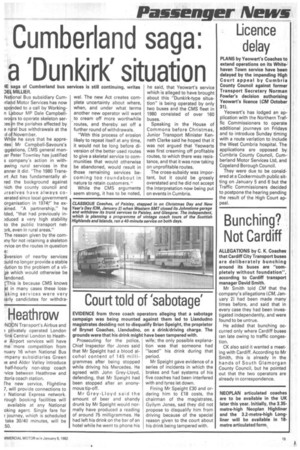Cumberland saga a Dunkirk' situation
Page 15

If you've noticed an error in this article please click here to report it so we can fix it.
is still continuing, writes National Bus subsidiary Cumirland Motor Services has now sponded to a call by Working
n Labour MP Dale Campbell'yours to operate skeleton ser.-;es lin the parishes affected by
• rural bus withdrawals at the id of November.
While he says that he appreites Mr Campbell-Savours's iggestions, CMS general manper Peter Townley has justified s company's action in withawing rural services in the anner it did. "The 1980 Transel Act has fundamentally aired the background against hich the county council and J r se I v es have always co)erated since local government organisation in 1974" he exained. "A partnership," he ided, "that had previously inKluced a very high stability to the public transport netork, even in rural areas."
The reason given by the cornmy for not retaining a skeleton rvice on the routes in question e: *version of nearby services child no longer provide a stable
■ lution to the problem of a vilbe which would otherwise be landoned.
it'This is because CMS knows at in many cases these loss'eking services were very )arly candidates for withdra
wal. The new Act creates complete uncertainty about where, when, and under what terms another new operator will want to cream off more worthwhile routes, and thereby set off a further round of withdrawals.
"With this process of erosion likely to repeat itself at any time, it would not be long before diversion of the better used routes to give a skeletal service to communities that would otherwise be abandoned, would result in those remaining services becoming too roundabout in nature to retain customers."
While the CMS arguments seem strong, it has to be noted, he said, that Yeowart's service which is alleged to have brought about this "Dunkirk-type situation" is being operated by only two buses and the CMS fleet in 1980 consisted of over 160 buses.
Speaking in the House of Commons before Christmas, Junior Transport Minister Kenneth Clarke said he hoped that it was not argued that Yeowarts was first creaming off profitable routes, to which there was resistance, and that it was now taking on unprofitable routes.
The cross-subsidy was important, but it could be grossly overstated and he did not accept the interpretation now being put on events in Cumbria.










































